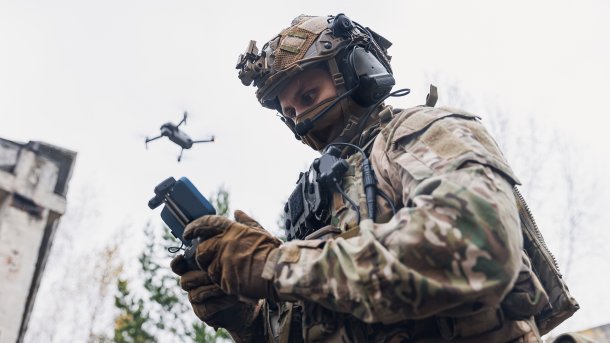More speed required in regulating autonomous weapons systems
The question of regulating autonomous weapons is causing debate. One of the topics discussed at a conference in Vienna was the fear of losing control.

Autonomous weapons systems have been in the possession of some states for some time.
(Bild: Parilov/Shutterstock.com)
The debate about autonomous weapons is gaining momentum as artificial intelligence (AI) becomes increasingly sophisticated. At the same time, calls for a binding treaty banning certain autonomous weapons systems are growing louder. In addition to the ten years of ongoing talks at the UN (United Nations), the Austrian government has invited to a conference this week to underline the urgency of a treaty.
Alexander Schallenberg, Austria's Minister for European and International Affairs, warned as host of the conference "Humanity at the Crossroads: Autonomous Weapons Systems and the Challenge of Regulation", warned that the community must finally formulate common rules. This is the only way to prevent machines from deciding over life and death in future conflicts. It is also important to prevent such software systems from increasingly falling into the hands of terrorists.
Hiroshima instead of Oppenheimer
Schallenberg received support from Skype developer and AI critic Jaan Tallinn. Tallinn warned that by advocating more speed through AI, we are increasingly relinquishing control, and not just in conflicts.
The use of target designation software by the Israel Defense Forces (IDF) and the software upgrades used in the Ukraine conflict, which give jammed drones the final decision on the target to be destroyed in an emergency, were also discussed in Vienna. In the case of jammed drones, a targeted jamming signal has interrupted the connection between the drone and the pilot. These are systems that early developers of legal standards such as Richard Moyes, one of the heads of the disarmament NGO (non-governmental organization) Article 36, explicitly warned against years ago, explained Sauer. "Our Oppenheimer moment, the Trinity test program, is over. I would rather call it a Hiroshima moment," he said.
Two-pronged approach advocated
Sauer, Moyes and the Chief Legal Officer of the International Committee of the Red Cross (ICRC), Carola Dröge, gathered the legal elements for a treaty in a round table on Monday. Meaningful human control over autonomous weapon systems does not mean that you have to understand all the algorithms in detail, said Moyes. However, an attacker must be able to assess what a weapon system can do in a particular situation. The geographical and temporal limitations of the systems are important. Weapons that cannot be subjected to such restrictions should be banned as a matter of principle.
According to Sauer, it is also important to move away from the idea that a specific list of weapon systems can be banned. Instead, the functions should be considered, right across the "kill chain". Many autonomous weapon systems, such as the Patriot anti-ship missiles, would otherwise be wrongly labeled as "killer robots".
(Bild: Monika Ermert )
Numerous European countries have agreed on a two-pronged approach. This involves banning fully autonomous weapons and regulating systems that are still controlled by humans. These countries include France, which helped initiate the idea, the Netherlands, which has already adopted its own national policy on autonomous weapons in 2021, and Germany, which still lacks its own, at least officially adopted, directive on the subject.
In view of the many ongoing projects for possible international regulation, one Dutch representative spoke of the fact that it will ultimately be more of a Grotius moment. Hugo Grotius is regarded as one of the founding fathers of enlightened international law.
Disagreement on the type of regulation
Despite the preparatory work and the urging of disarmament experts, NGOs and regional conferences in Latin America and Africa, the drafting of rules has stalled. The Lethal Autonomous Weapons (LAWS) expert group of the UN Convention on Conventional Weapons (CCWUN) has been entrusted with this task under the UN umbrella. The blockade stance of Russia and a number of other countries has so far prevented the start of negotiations on a binding treaty under international law.
The USA had already pointed out at the most recent CCWUN meeting that it already had fully autonomous weapons systems. They were more in favor of a political declaration in the style of last year's voluntary commitment to the responsible use of AI and autonomy in military applications. However, experts like Dröge believe that such voluntary commitments are not enough. The ICRC and Amnesty head Agnès Callamard are therefore calling for negotiations to take place directly at the UN General Assembly instead of at the disarmament conference in Geneva. The advantage: unanimity is not required in the General Assembly. The first UN resolution on autonomous weapons was therefore adopted last November by a majority of 164 states, with five votes against and eleven abstentions.
Report on positions to be available in summer
However, this resolution did not yet include a mandate for treaty negotiations. However, António Guterres is now to compile a report on the national positions of all member states by the summer. Guterres has called on the international community to present a binding legal instrument by 2026.
Previous disarmament treaties, such as the treaty on cluster munitions or the ban on anti-personnel mines, could only be implemented in a roundabout way in some cases. When asked whether the Vienna conference was also intended as a prelude to such a process, Alexander Kmentt, Austrian Ambassador and Director of the Disarmament, Arms Control and Non-Proliferation Department in the Vienna Foreign Ministry, replied: "The aim is to achieve the strongest possible report from the UN Secretary-General in July. The discussions on autonomous weapons systems need more momentum and must urgently lead to negotiations, in whatever format these are possible."
(anw)